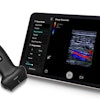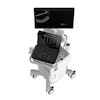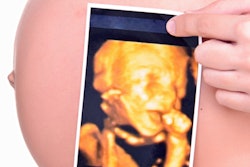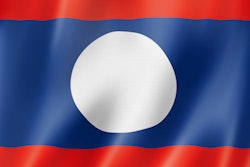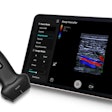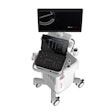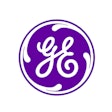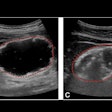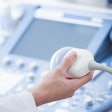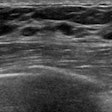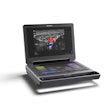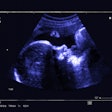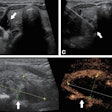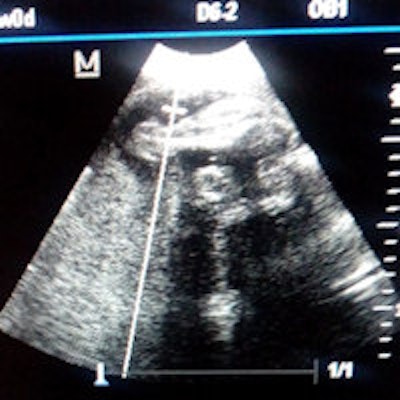
Patients in rural areas of Nigeria may not have ready access to experts for potentially lifesaving consultations on complicated ultrasound exams. Fortunately, there's an app for that, according to a talk at the recent International Society of Ultrasound in Obstetrics and Gynecology (ISUOG) congress in Montreal.
Presenters described a test that involved 3D/4D ultrasound studies sent via the popular WhatsApp multimedia messaging mobile app to five expert consultants at three Nigerian university hospitals. The expert consultants had high levels of diagnostic agreement with onsite ultrasound practitioners as well as with each other, researchers found.
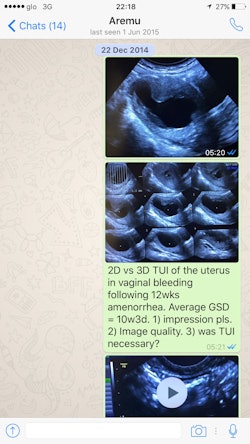 Ultrasound case sent via WhatsApp for remote expert consultation. All images courtesy of Dr. Victor Oboro from Ladoke Akintola University of Technology and Omvial 4D Ultrasound.
Ultrasound case sent via WhatsApp for remote expert consultation. All images courtesy of Dr. Victor Oboro from Ladoke Akintola University of Technology and Omvial 4D Ultrasound.What's more, patients appreciated the opportunity to have such easy access to remote expert consultations, according to lead investigator Dr. Victor Oboro of Ladoke Akintola University of Technology in Ogbomoso, Nigeria.
"The interpretations were accurate and reliable and acceptable to patients," said Oboro, who is also director of Omvial 4D Ultrasound centers of Benin City and Ibadan, Nigeria.
Teleultrasound via WhatsApp has enabled remote consultation on the timing of deliveries, the diagnosis of fetal heart failure, and the identification of ectopic pregnancy, he said.
Ultrasound teleconsultation
Oboro and presenter Dr. Janet Akinmoladun, also of Ladoke Akintola University of Technology and Omvial 4D Ultrasound, had been exchanging ultrasound images from the 4D ultrasound centers using WhatsApp. While impressed by the accuracy of the results, they wanted to validate this approach with a research study, according to Oboro.
"We felt we had to subject it to formal experimental validation, as we could not find any literature on which to base the practice," Akinmoladun told AuntMinnie.com. "Moreover, it has the potential to address the need for many rural settings in developing countries to access expert ultrasound teleconsultation."
As a result, they set out to determine diagnostic agreement and reliability, as well as patient opinions about the use of WhatsApp to provide access to expert remote teleconsultation.
Screen snaps
Ultrasound studies at the centers are acquired using a Voluson P6, P8, or i scanner (GE Healthcare), sometimes in multiple planes, Akinmoladun said. After an onsite ultrasound practitioner used a mobile device camera to take a picture of the ultrasound monitor, the image was sent -- along with textual information such as indications for the scan and any other relevant patient information -- via WhatsApp to five consultants at three university teaching hospitals in Nigeria for remote diagnosis.
The researchers found a 93% mean agreement between the diagnoses made by the onsite ultrasound practitioner and the remote consultants. A mean kappa coefficient of 0.89 -- representing substantial interreader agreement -- was found for the three diagnostic categories of ob/gyn, abdominal, and small-parts conditions, according to the group. The mean kappa coefficients were statistically significant (p < 0.05).
| Reader agreement for teleultrasound scans | ||
| Condition | Mean sensitivity | Mean specificity |
| Ob/gyn | 81% | 79% |
| Abdominal | 88% | 86% |
| Small parts | 79% | 81% |
They also calculated interreader variability by comparing in pairs the primary diagnoses made by the five university consultants. Overall, the mean agreement for all diagnoses was 83%. The mean kappa coefficient of 0.7 is also considered to represent substantial agreement and was statistically significant (p < 0.05).
In cases in which interpretation requires seeing the images in more than one plane, the interpreter needs to ask the operator to rescan the patient in different planes, Akinmoladun noted. A short video clip of the scan can also be requested.
"And if there is still difficulty in making a diagnosis, one can forward the images by WhatsApp to other colleagues for second opinions; since most of them use WhatsApp, it's usual to get a response within minutes," Akinmoladun said. "Most interestingly is the fact that the difficult-to-interpret cases are not the ones responsible for maternal mortality in our settings."
A behavioral medicine physician assessed patients' opinions on the use of WhatsApp to receive remote consultation on their ultrasound studies. Patients preferred the method over being referred elsewhere for a second opinion or waiting for experts to come for another review, Akinmoladun said.
"At any rate, they were happy to get an expert opinion without having to travel to meet such experts," she said. "They felt it saved a lot of hassles and expenses."
Cases and a bitter lesson
Several recent cases demonstrated the power of teleultrasound via WhatsApp, Akinmoladun said. A patient with poor fetal growth had an umbilical artery Doppler image (see below) that required a fetal medicine ultrasound expert to interpret and provide advice on the timing of delivery.
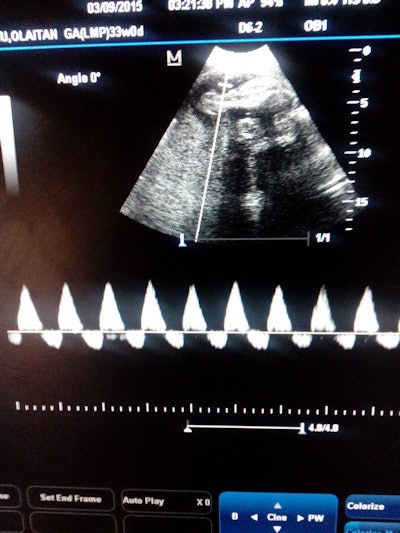
"Were it not for WhatsApp teleultrasound, no such expert could be consulted during the period [it was necessary]," she said.
In another case that sadly ended in tragedy, a sonographer performing a fetal heart assessment believed there was something unusual about the heart and sent the image as a video clip (see below) via WhatsApp for remote analysis.
 
Click image to view video. |
In the meantime, however, the referring physician had sent the patient to another sonographer for a second opinion. Although the second sonographer indicated that the heart was "normal," the remote fetal medicine ultrasound experts reported that the fetus was having heart failure, Akinmoladun said.
The baby appeared clinically normal at delivery and no further action was taken by the referring physician. After reviewing the case again, the experts were sure that the heart was failing and tracked down the mother to advise her to take the baby for pediatric echocardiography. Unfortunately, the mother informed them that the baby had died three days after birth.
"We learned the bitter lesson then that WhatsApp teleultrasound is something to be taken seriously, as it allows us to access expertise from anywhere in the world," she said. "In many other cases, women have been spared unnecessary surgery for ectopic pregnancy, and also many ectopic pregnancies could have been missed had we not sought expert opinion through WhatsApp teleultrasound."
Easy to use
Akinmoladun noted that WhatsApp is easy to use and is even preinstalled on most mobile devices.
"The results are prompt because WhatsApp is used daily, does not require special logging in to a workstation, and is instantaneously received anywhere the remote interpreter is," she said. "The most interesting aspect is that even when you are busy, once you receive a WhatsApp notification you are curious, and on seeing the images, your diagnostic acumen is challenged and you find yourself giving your opinion."
In addition, WhatsApp does not require the purchase of any hardware or specialized software and is not dependent on immediate access to electricity, she said. Also, high-definition images can be transmitted easily without the need to compress or decompress the images.
These benefits address traditional teleultrasound barriers such as the need to install expensive equipment with special software, receive extra training to operate the equipment, and be available at the location where the equipment is being operated, she said.
"We believe that 3D/4D ultrasound is best for WhatsApp teleultrasound because it can display many dimensions of the same image at once, but our findings also show that the commonly available 2D machines are also usable," Akinmoladun said.
Training
Oboro said he is now organizing training sessions on how to perform 3D/4D teleultrasound using WhatsApp, including an upcoming event November 15-17 in Nigeria.
"We believe that this appears to be the only way to reach most women in developing countries with expert ultrasound," Oboro said.
GE is also providing some support for the training, he said.
In the next phase of their work, the researchers hope to investigate the use of handheld ultrasound machines, as these would be more feasible for remote areas. They are planning to contact manufacturers of those systems, Oboro said.
"Also, we have contacted some U.K. fetal medicine experts who are willing to be ultrasound teleconsultants to developing countries," he said.

